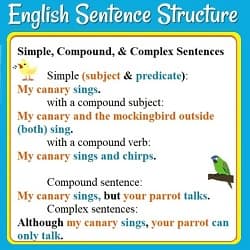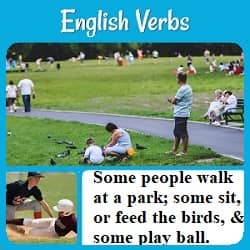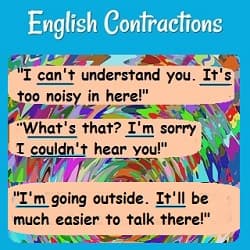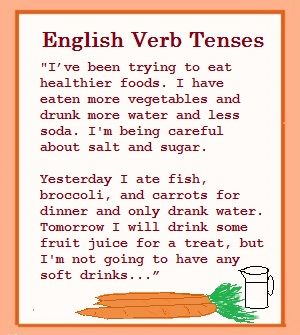How to Form Negative Sentences
English negative sentences follow the same basic word order as affirmative sentences.* They start with a noun or pronoun as the subject, and then the verb and the rest of the predicate. (Negative commands, like positive ones, omit the subject.)
The main difference: to make a verb negative, put a helping verb and ‘not’ in front of it. (Negating the verb is the usual way to make a negative sentence.)
See the examples below, then read the explanation.
See also other ways to make sentences negative (besides using 'not') at the bottom of this page.
*(Also see Question Formation for the important differences in word order in English questions, negative or affirmative.)
Some Examples Using 'Not':

To make these examples as clear as possible, the subject is orange and the predicate is blue.
Mary doesn’t drink coffee.
My brothers don’t speak Chinese.
Jim's best friends don’t live near him.
I didn’t go to the store last week.
Lions do not eat grass.
Esther can’t go tomorrow.
Some people won’t eat spicy foods.
Bill hasn’t learned to type.
You shouldn’t cheat on tests.
Explanation
'Do' is the most common helping verb for negative sentences. We use it whenever the affirmative sentence does not have a helping verb. (Mary likes ice cream. She does not like cake.)
For the perfect or continuous tenses, use ‘have’ or ‘be’ instead. (We can also use 'be’ without a helping verb. It’s the only verb in English that does not need a helping verb for negatives.)
We can also use a modal verb like ‘can’, ‘will’, 'would', or ‘should’ + not to make a sentence negative.
It’s very common to use contractions in speech and informal writing. In fact, English speakers rarely use ‘do not,’ 'cannot,' or ‘will not’ except when we want to really emphasize ‘not.’
Instead of saying 'he does not,' we say 'he doesn't.' 'Will not' changes to 'won't,' 'can not' to 'can't' and 'are not' to 'aren't.' See Modal Verbs and The Verb to Be.
Remember,
- use doesn't (or does not) for 3rd person singular: he or she doesn't go. (The main verb-- 'go' in this sentence-- stays in the base form, without an '-s' or '-es' at the end. See the Helping Verb section of English Verbs.)
- use don't (or do not) for I, you, or plurals: I don't go, you don't go, we don't go, and they don't go either,
The video below is a funny rap song showing the use of all the negative contractions in English. Several of them (daren't, mayn't, shan't) are almost never used, at least in American English.
(I would guess those forms are quite uncommon in other parts of the English-speaking world too.)
The full text for this video only shows on computers, tablets, or a phone held horizontally. It's too large for a vertical mobile screen. Sorry!
If you liked that video, you might like his Positive Contractions, on the English Contractions page. (It has an explanation and examples as well as the video.)
Negative Contractions with 'Be'
The following examples show negative statements using the verb ‘be.’
‘Be’ does not need a helping verb (although t may act as one).
Jenny isn’t fat.
You are not lazy.
Your brothers aren’t lazy either.
Jim and Sue aren’t working today.
They weren’t feeling well.
In fact, they haven’t been feeling well all week.
Larry won’t be able to go.
Other Ways to Form Negative Sentences
It is also possible to express a negative meaning without using ‘not’ or a helping verb.
English has a rule that does not allow double negatives. (The thinking is that two negatives make a positive. If “nobody doesn’t like ice cream,” that must mean everybody does like it.)
So if you use negative words (never, neither, no ___, none, no one, nobody, or nothing, etc.) in a sentence, do NOT make the verb negative.
English speakers sometimes violate this rule. Some groups use double negatives routinely. Others may use them to seem less 'formal' when talking to friends.
Even so, double negatives like "he doesn't take no guff" or"I didn't see nothing" make a person sound uneducated if used in the wrong company. It's safer to practice 'standard' English all the time.
Examples of Negative Sentences Without 'Not:'
Mary never drinks coffee.
None of Jim's best friends lives near him.*
Lions never eat grass.
Neither of them has been feeling well*.
Nothing is as refreshing as a cold shower on a hot day.
No one (or nobody, or none of the students) in my class studies Latin.
*Note the singular verbs, because ‘none’ is singular. The prepositional phrase ‘of Jim’s friends’ modifies the pronoun ‘none,’ which is the simple subject. The same is true for ‘neither of them.’
Some of these sentences could also be written using a helping verb plus 'not.' Notice the differences:
Mary doesn't ever drink coffee.
Lions don't ever eat grass.
(More complicated):
We do not have anyone (or anybody) in my class who studies Latin. (This complex sentence has two clauses, each with a subject and predicate.)
More Examples of Sentence Order
Do you have questions about English sentence structure? Check out these explanations & examples of the word order for many kinds of sentences (including those with phrases and direct or indirect objects).
Learn the basic forms of English verbs to increase your confidence in English.
Why are English contractions so popular, and how can you recognize them when people are speaking fast? Find out— with lots of examples to read and listen to.
Home>English Grammar Lessons>Negative Sentences.
Didn't find what you
needed? Explain what you want in the search box below.
(For example, cognates, past tense practice, or 'get along with.') Click to see the related pages on EnglishHints.
| site search by freefind | advanced |









